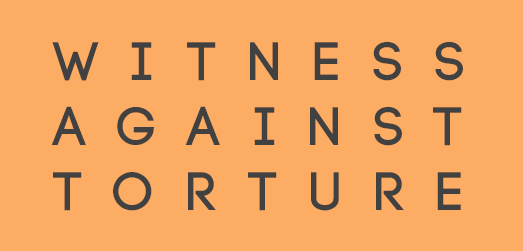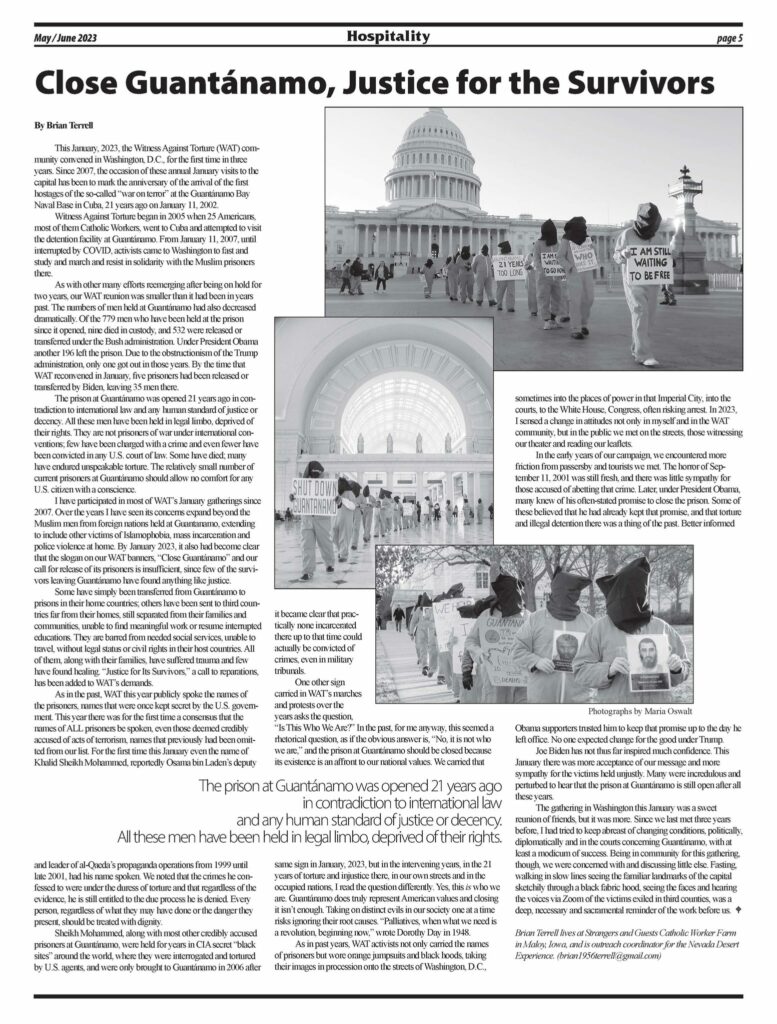Witness Against Torture and Immigrant Detention
By Jeremy Varon | Aug. 26, 2025
The following, short text seeks to open a conversation within WAT and other anti-torture advocates about the possibility of taking bold public action to protest immigrant detentions and their echoes of “war on terror” detention polices and practices. I propose for consideration a journey to, and act of protest and witness at, a prominent immigrant detention prison, recalling the journeys WAT took to Guantanamo in 2005 and 2015. I also sketch very preliminarily what such a witness might look like and what it might accomplish. Other possibilities for action exist and may be productively discussed.
For two decades, Witness Against Torture has been a voice of conscience and resistance, demanding the closure of the “war on terror” prison at Guantanamo, compensation for the victims, accountability for the perpetrators, and an end to U.S. torture. It has also confronted the Islamophobia and racism at the heart of “war on terror” detentions. This work continues, again opposing an administration that supports torture.
Witness Against Torture and its allies recognized the war on terror torture program, and its signature prison in Guantanamo, as special evils. The United States brazenly committed to torture as an explicit policy, carried out in global nexus of detention centers, intended to be secret from the world.
At the same time, WAT understood that the abuses of overseas, War on Terror detentions mirrored abuses within the domestic penal system. Hence, it campaigned — sometimes in coalition with domestic prison reform/abolition advocates — against solitary confinement, draconian sentencing, the routine violence in prisons and jails, and the racism endemic to policing and the broader criminal “justice” system.
Today, these continuities of cruel, inhumane, and degrading treatment rage in the Trump administration’s intensified war on immigrants and foreign visitors. Daily, we are confronted with a grotesque tableau of violence and terror: frightening raids by armed, masked men of parking lots and playgrounds; the abduction of foreign students and faculty for their pro-Palestinian views; the rendition of alleged gang members to torture prisons, like in El Salvador, or to violent corners of the world; the whisking away of beloved community members, with no criminal records, to immigration prisons; the arrest of elected officials challenging ICE; and the incessant demonization of immigrants as murderers, rapists, and thugs. Less visibly, hundreds of thousands of detained migrants suffer gross abuses in an expanding archipelago of immigration detention centers.
Awful in its own right, all this recalls “war on terror” regimes of capture and confinement. Attorneys, human rights advocates, pundits, scholars, and other researchers have highlighted the continuities. Linda Gordon, for example, has described the sending of Venezuelans to El Salvador as extraordinary rendition to a site of torture, just like the Bush administration perpetrated. A coalition of legal and human rights collectives (including the Center for Constitutional Rights, which challenged “war on terror” laws and practices) issued a report detailing the use of “war on terror” ideologies and practices in the attack on immigrant and foreign visitors and the suppression of political speech. Timothy Snyder has described the Trump administration’s threatened gutting of habeas corpus — clearly recalling efforts under Bush — as the chilling essence of the passage to a “terror state.” Spencer Ackerman, in his blog “Forever Wars,” offers rolling commentary on how the “war on terror” continues to pervade state policies, with respect to immigration and beyond.
Exposés of abuses in immigration prisons eerily recall early reports of abuse at Guantanamo and other “war on terror” prisons. Human Rights Watch documented physical and verbal violence, the denial of basic health care, and putrid cells in a report on conditions in three migrant detention centers in Florida. Various media reports, as well as the testimony of an ex-guard, allege the same in the notorious “Alligator Alcatraz” facility. The office of Senator Jon Ossoff (D-GA) compiled a report counting more than 500 credible human rights abuses in immigration detention — many suffered by pregnant woman and minors. Homeland Security, ICE, the White House, and other government agencies answer charges of abuse with categorical denials and crude boasts about their draconian, anti-immigrant policies.
Millions of Americans, and people residing in the United States, are horrified by the government’s conduct. Even many broad supporters of Trump’s “tough on immigrants” stand feel that current policies are too extreme. Organized resistance exists, if sporadically. It includes public demonstrations, solidarity rallies highlighting individual detainees, condemnation from elected officials, viral videos exposing ICE cruelty, and numerous lawsuits challenging myriad policies and practices. But the resistance, as yet, nowhere near captures the outrage and sadness people feel. Nor has it been remotely effective in stemming even the most outrageous Trump administration policies. More — and more effective — protest is clearly needed.
***
I am proposing here that Witness Against Torture, and its allies, consider a bold, highly visible protest/witness action that addresses current abuses. Specifically, I offer the possibility of a WAT delegation physically travelling to an especially abusive migrant detention center — likely in Florida — to hold a fast, vigil, and protest, much like WAT did in Cuba in 2005 and 2015. The basic idea is to make a moving spectacle of our conscientious disdain of Trump’s war on immigrants; make connections to “war on terror” policies; attract and catalyze the activism of others; garner the attention of the media; and, ideally, compel some response from the agencies we target. No doubt, such an action comes with risk. As ever, it could be mostly ignored by the media and the powers that be. It also could be suppressed, even violently so, by any manner of law enforcement. But the rewards could be substantial: the expression of our own moral conscience, a show of solidarity with victims of U.S. government abuse, media attention, and a positive, inspiring example of public action.
The ideal venue for such a protest would likely be “Alligator Alcatraz” in Ochopee, Florida. Its defenders laud it as the perfect realization of Trump administration policies and federal-state partnership in the war on immigrants. To its critics, it is a sinister site and symbol of the cruelty of those policies. Human rights advocates and families of people detained there have held events near to the prison (though I do not know what access exists). A well-planned and publicized action could well attract at least fleeting media attention, and visibility through social media.
As to timing, it would take months of planning. January 11, 2026, the 24th “anniversary” of the opening of the prison at Guantanamo, makes good sense. Florida is warm in winter. News tends to be slow in the new year. And, most obviously, it’s an occasion to highlight the connection between “war on terror” and immigrant detention. Also, Governor DeSantis was physically stationed in Guantanamo when he was a military lawyer, adding to a sense of the connection. The protest could also address Gaza, both as another humanitarian crisis and crime, and insofar as some immigrants and foreign visitors are being detained and deported on account of their advocacy for Palestine. Finally, the demonstration could articulate the connection between the demonization of (brown-skinned) Muslim, Arab, and South Asian people as “terrorists” and the demonization of (brown-skinned) people from south of the U.S. border as “criminals,” “aliens” and, in their own right, “terrorists.”
One big issue: a federal judge just recently ordered the closure of “Alligator Alcatraz” due to the violation of environmental regulations and other protocols in its construction. The Trump administration will surely appeal the ruling; one can only guess at the fate of the facility. But it may not exist a few months from now, in which case another detention center could be chosen.
Back to a possible action. A minimal version would entail a small delegation — one to several dozen — travelling to and holding vigil at a migrant prison. The action would need basic branding, press outreach, and amplification through social media. Very advantageous, I think, would be to have demonstrably religious people present (clergy would be good) who frame their protest in the language of faith, of what is moral, just, and godly.
A more ambitious version would try to rally and work with existing organizations and campaigns that address migrant detention. Assembling such a coalition would be painstaking work, but may dramatically enhance the action. Latinx and Caribbean peoples are the primary (though far from only) victims/survivors of the immigration crackdown. Best if their voices, experiences, expertise, and witness are prominent in any action. Advocacy groups within those communitiesalso are part of networks through which news of the protest, and participation in it, could spread.
How limited or ambitious, small or big, to go would need of course serious discussion. Issues of capacity, identity, and agency would doubtless come up. But there are real possibilities.
***
The above offers a concise description of the nightmare we face and a bare sketch of a possible, collective response that feels true to WAT’s history, values, and purpose. It lays out one possibility, among many. Other ideas are welcome. Issues of capacity feel especially germane. Whether folks have the passion, time, resources, and energy for anything like this is an open question. We owe it, I think, both to ourselves and the victims of U.S. government abuse, to at least explore the question.








